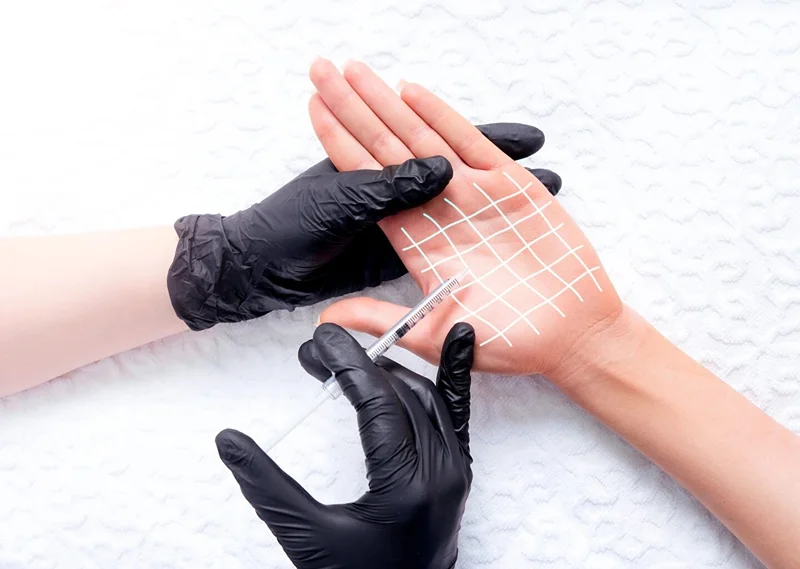Targeted Dermatology Treatments for Hyperhydrosis of Hands and Feet: Reliable Solutions
Targeted Dermatology Treatments for Hyperhydrosis of Hands and Feet: Reliable Solutions
Blog Article
Recognizing the Root Causes of Excessive Sweating and Its Influence On Life
While it is typically recognized as a physical action to regulate body temperature level, the triggers for extreme sweating can vary commonly among people, incorporating not only physical factors but psychological and additionally emotional elements. By diving into the root causes of hyperhidrosis and exploring its diverse impacts, a deeper understanding of this prevalent problem can be gained, shedding light on the complexities that individuals grappling with too much sweating navigate on a daily basis.
Physiology of Sweat Glands
The policy of sweat production, a critical physiological process, is mainly regulated by the activity of sweat glands distributed across the human body. Sweat glands are classified into two major kinds: eccrine and apocrine glands.
When the body temperature climbs, either as a result of exercise, heats, or emotional anxiety, the nervous system activates the sweat glands to create sweat. This sweat is made up mostly of water and electrolytes like sodium and chloride. The process of sweat production is important for keeping the body's inner temperature level within a slim, optimum variety, highlighting the crucial function gland play in human physiology.
Triggers for Excessive Sweating
In understanding the root creates of extreme sweating, it is important to recognize the triggers that can lead to this physiological response. Physical exertion, high temperature levels, and spicy foods are also understood to cause excessive sweating in individuals prone to this condition.
Moreover, medications such as some antidepressants, opioids, and certain supplements can also work as triggers for hyperhidrosis. Understanding these triggers is essential in managing extreme sweating efficiently - Exessive Sweating. By recognizing and resolving the specific triggers that trigger too much sweating in a specific, doctor can create individualized therapy plans to reduce this problem and boost the individual's quality of life
Medical Conditions Associated
Related to too much sweating are different medical problems that can aggravate this physiological feedback. One usual condition is hyperhidrosis, a disorder characterized by abnormally boosted sweating that exceeds the body's thermoregulatory demands. This can show up in focal areas like the hands, soles, underarms, or face, impacting an individual's quality of life because of social humiliation and pain.
In addition, endocrine problems such as hyperthyroidism, diabetes, and menopausal hot flashes can likewise result in excessive sweating. Hyperthyroidism creates an overflow of thyroid hormones, accelerating metabolism and causing sweating. Diabetic issues can generate sweating episodes, specifically during hypoglycemic episodes when blood sugar level degrees drop too low. Menopausal warm flashes, associated to hormone changes during menopause, can create intense and sudden sweating, usually accompanied by flushing and heart palpitations.
Additionally, infections like hiv, consumption, and endocarditis have actually been related to night sweats, an usual symptom understood to interfere with sleep and affect overall well-being. These clinical problems highlight the varied array of underlying factors that can contribute to excessive sweating, demanding thorough evaluation and administration by medical care professionals.
Emotional and Mental Aspects

Effect On Social Communications
Extreme sweating can have profound results on a person's capability to engage easily in social interactions. The visible signs of sweat discolorations or wet spots on clothes can lead to embarrassment and self-consciousness, triggering individuals to take out from social situations. This withdrawal can influence relationships, limit social activities, and impede individual and specialist growth.

Additionally, the anxiousness and self-confidence problems stemming from too much sweating can impact communication and social abilities. People might have a hard time to concentrate on discussions, join team tasks, or express themselves confidently. This can lead to feelings of seclusion and isolation, as social links end up being testing to keep.
Final Thought

While it is typically understood as a physical feedback to control body temperature, the triggers for extreme sweating can differ commonly amongst people, including not only physical elements however mental and also emotional elements. By delving right into the origin causes of hyperhidrosis and exploring its diverse impacts, a much deeper understanding of this prevalent problem can be gained, losing light on the complexities that people grappling with excessive sweating navigate on a day-to-day basis.
Physical physical effort, high temperatures, and spicy foods are likewise known to activate too much sweating in individuals susceptible to this problem. By recognizing and resolving the particular triggers that motivate extreme sweating in a private, medical care carriers can develop personalized therapy strategies to reduce this condition and enhance the person's quality of life.
Extreme sweating can have extensive impacts on an individual's capability to Exessive Sweating engage easily in social communications.
Report this page